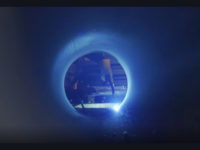NDT | Back 2 Basics
Industry Trends: Third-Party NDT Certification Programs Advance Digital Expertise, Standardize Industry Practices
The public deserves to have confidence in their NDT professionals.

Images source: Getty Images
Testing and quality control must keep pace as materials science and construction grow in complexity. Tremendous advances in digital technology now allow us to apply cutting edge nondestructive testing (NDT) tools and methods to detect flaws and defects in materials before they cause building delays or public harm. These technical advances also mean that inspection practices have gotten more sophisticated and require higher levels of expertise and training.
The NDT industry is poised to meet this challenge with a growing number of specialized certification programs that will standardize inspection practices across an array of industries.
NDT offers quality assurance and security by using advanced technologies, such as magnetic particle testing, liquid penetrant testing, radiographic and ultrasonic, among others, to evaluate materials for their physical integrity. NDT inspections are cost efficient and effective because they can be conducted at any time in the construction or building process, in new buildings and old buildings alike, and in areas that may be difficult to access by other means.

At the American Society for Nondestructive Testing (ASNT), the world's largest technical society for nondestructive testing professionals, we believe that the public deserves to have confidence in their NDT professionals. To achieve that, we advocate for certification programs that ensure every NDT professional possesses the training and experience to deliver the highest level of expertise.
Due to the complexity of NDT science, inspectors who use NDT are highly trained and certified in the use of the equipment, methodology and materials science. Many industries require NDT personnel to be certified in specific methods unique to the industry. The best training programs provide real-world experience that includes testing materials for flaws and defects. Although certification expires every five years, rapid advances in technology mean continuing education, in addition to recertification, is essential.
ASNT now offers its own training courses through NDT Classroom for NDT personnel as a third-party organization.
For example, ASNT currently has certification programs for the oil and gas industry. ASNT’s Industry Sector Qualification – Oil & Gas (ISQ-O&G) program focuses on instructing NDT personnel how to conduct inspections on in-service materials. It allows professionals the chance to test materials that were used in the field and not manufactured for training purposes with flaws built in.
Other industries with the need for more NDT inspectors include nuclear, aerospace and aviation, general construction, and maritime construction.
In addition to a need for specific industry training, the nature of NDT certification has evolved to include operation of advanced software and data analysis.

FROM ANALOG TO DIGITAL
More than 20 years into the digital transition, most successful inspection businesses have moved away from analog signal processing systems. Digitized NDT inspection systems provide increased data collection capabilities, improved detection accuracy, and more. The adoption of more advanced digital technology demands that the NDT industry update its certification and qualification programs accordingly to include more in-depth instruction on how to operate and optimize advanced software.
IMPORTANCE OF IN-SERVICE INSPECTION
As the inspection industry evolves, the trend towards a greater emphasis on in-service inspection after initial construction will expand. Throughout the years, more government mandates have emerged requiring operators to conduct periodic in-service inspections of aging infrastructure and machinery. NDT plays a crucial role in risk-based assessments to accurately detect the presence of corrosion or cracking and prevent potential failure and fatal harm.
Third-party organizations, like ASNT, must lead the charge in the development of in-service inspection qualification programs. These programs can ensure NDT professionals can conduct impartial inspections and analyze the gathered data to deliver the product integrity information that will prevent accidents, reduce costs, and meet regulations.

VALUE OF THIRD-PARTY PROGRAMS
As training needs grow, industry watchers can also expect to see growth in the use of third-party certification programs by inspection companies. These third-party certifications, such as the ones offered by ASNT programs, support mandated qualification requirements. We believe that these third-party programs will contribute to the development of industry standard qualifications and certifications that will cross national and international boundaries, ensuring that all certified NDT personnel share a uniform set of skills and a commitment to the highest industry standards.
Although our accreditation and training programs are held under the umbrella of ASNT, organization members consult unaffiliated industry experts to update the course curriculum according to developing inspection standards and practices.
Such certification programs also benefit NDT personnel. By gaining certification through third-party certification programs, NDT professionals can get industry recognition, career development opportunities and confidence in their inspection abilities.
With companies focused on providing the best inspection service for their clients, third-party organizations have the bandwidth to develop high-quality, cost-effective certification programs that meet government safety and qualification standards.
Looking for a reprint of this article?
From high-res PDFs to custom plaques, order your copy today!





